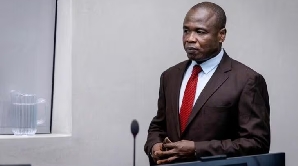Nearly 50,000 victims of Ugandan militia commander Dominic Ongwen should get a total of over €52 million ($56 million) in compensation, International Criminal Court (ICC) judges ruled on Wednesday, in a record reparations order.
Judges said Ongwen, a former child-soldier who rose through the ranks to become one of the top commanders of the notorious Lord's Resistance Army (LRA) rebels, did not have the resources to pay the compensation himself.
Instead, they asked the tribunal's own Trust Fund for Victims to help cover the cost.
The reparations will be in the form of a symbolic individual payment of €750 per victim and additional collective reparations like rehabilitation programs and memorial sites.
Ongwen was convicted and sentenced to 25 years in prison in 2021 on 60 counts of war crimes and crimes against humanity, including rape, murder and child abduction. He is currently serving his sentence in Norway.
Led by fugitive warlord Joseph Kony, the LRA terrorised Ugandans for nearly 20 years as it fought the government of President Yoweri Museveni from bases in Northern Uganda and neighboring countries. The militia has been largely wiped out, but Kony remains one of the ICC's most wanted fugitives.
Ahead of the ruling Louis Lakor, a 29-year-old Ugandan who was kidnapped by the LRA as a boy, told Reuters that reparations could only ever be symbolic "because in reality there's no amount of money that can compensate for the crimes the LRA committed".
The rebels murdered his parents and forced him to kill his sister, he said.
"How can you compensate those who died, or those with invisible wounds or victimhood like the children who were born in the bush, those whose parents were killed?" he asked.
The total number of victims is estimated at almost 50,000 and includes victims of attacks on refugee camps, and women and children who were abducted and forced to become child soldiers or sex slaves. The ICC judges calculated the total sum of the reparations to be €52.4 million, by far the largest the court has ordered in a case.
The judges cautioned that "victims cannot expect payments to be executed soon after the issuance of this reparations order".
In addition, they warned that the Trust Fund for Victims, which relies on voluntary contributions, might not be able to raise enough money to match the sum ordered.
Africa News of Thursday, 29 February 2024
Source: theeastafrican.co.ke

















